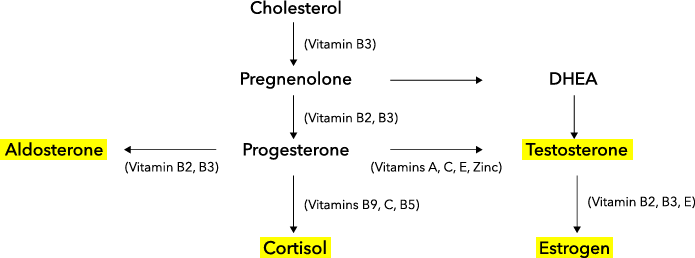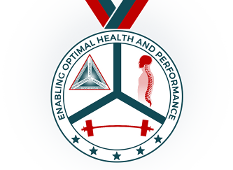As we all know, today’s world can be very stressful. And the effects of stress on the body can have many consequences, not to mention an alteration in hormonal levels. Cortisol is known colloquially as the body’s “stress hormone”; that is to say, it is released during times of stress. The basic purpose of this is to increase blood sugar, preparing us for fight or flight. As a result, more cholesterol is shunted towards the cortisol pathway and we produce less aldosterone, testosterone and estrogen. Under prolonged stress, this can create serious health concerns. Below is a simplified chart of the cholesterol hormone cascade of the adrenal cortex:

Additionally, dietary deficiencies in any of the micro-nutrient catalysts listed (Vitamin B2, B3, B5, B9, A, C, E and Zinc), will eventually result in hormonal deficiencies as well.
Aldosterone–is a mineralocorticoid that is primarily responsible for regulating re-absorbtion of sodium from the kidney. This plays a large role in maintaining systolic blood pressure and proper hydration levels.
Testosterone–is a sex hormone that regulates bone and muscle mass, fat deposition, red blood cell production, sex drive and and sperm production in men, as well as many other functions. Low testosterone levels have been linked with depression.
Estrogen–is responsible for the development of female secondary sexual characteristics, and stimulates the growth of the endometrium. It also plays a role in the resorption and formation of bone, as well as many other functions. In males, estrogen aids in the maturation of the sperm.
The above article is simplified and is not intended as a substitute for advice from your medical doctor or naturopath. It only serves to underscore the importance of a healthy diet and manageable stress levels. Suggested food sources of macro- and micro-nutrients are listed below (not comprehensive):
Cholesterol: cholesterol will be present to varying degrees in any food derived from animals
Vitamin B2 (Riboflavin): beef liver, avocado, salmon, spinach
Vitamin B3 (Niacin): beef liver, salmon, avocado, nutritional yeast
Vitamin B5 (Pantothenic Acid): avocado, chicken, eggs, sweet potato, broccoli
Vitamin B9 (Folate): green leafy vegetables (lettuce spinach, kale, etc.)
Vitamin A: coloured vegetables (carrots, squash, pumpkin) butter, cod liver oil, broccoli
Vitamin C: oranges, strawberries, sauer kraut, potatoes
Vitamin E: wheat germ oil, almonds, sunflower seeds
Zinc: pumpkin seeds, beef, brewer’s yeast
